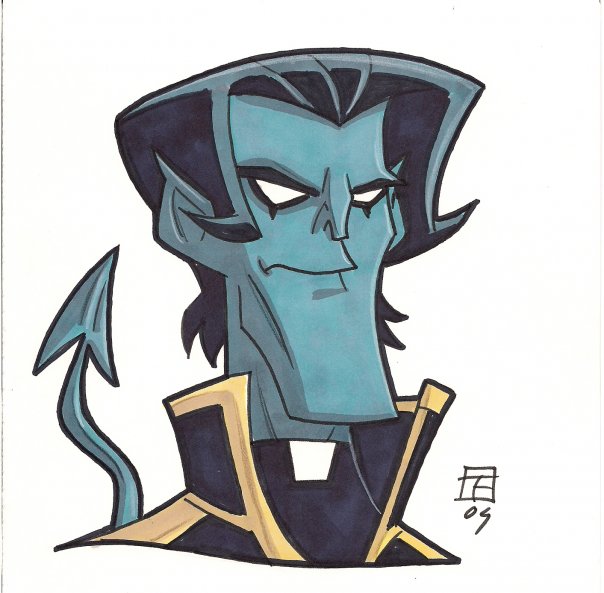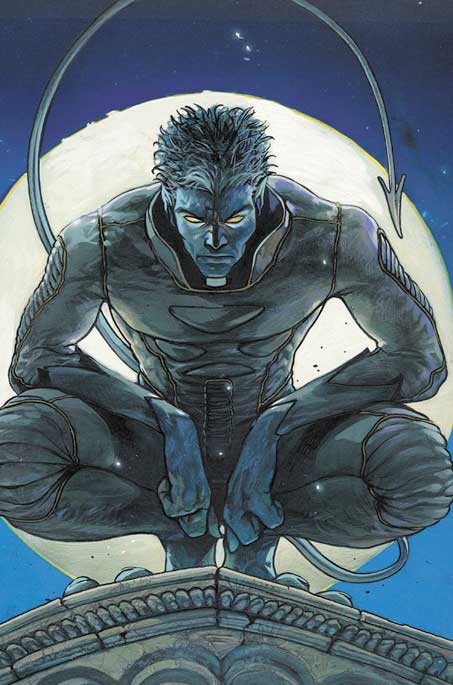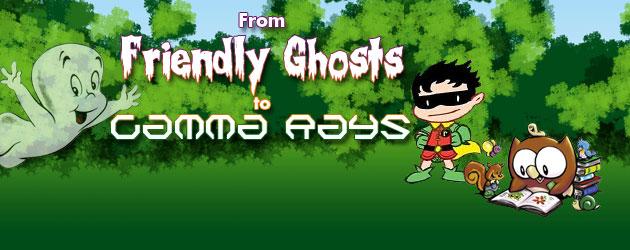Welcome to Comics Are My Religion, a look at theology through the lens of comic books. There are some basic ground rules about engaging in respectful dialogue about religion in this column. Be warned, if you haven’t read the comics discussed below, you might want to go read it and come back, as this column may contain spoilers!

As many of you know, X-Force #26, which is part five of the Second Coming event in the X-Men line of books at Marvel, included the first major casualty of the crossover: Kurt Wagner, aka Nightcrawler. This is a sad day for X-Men fans, and so, being the resident clergy-type at Comicattack.net, I thought it only right to give Nightcrawler a proper eulogy, (since all Matt Fraction did was have Iceman quote Scripture in Uncanny X-Men #524). Since Nightcrawler was one of the most religious characters in the Marvel Universe, and my favorite X-Man, it’s fitting that we remember him for his contribution to both comics and religion. So here you go:
Kurt Wagner was not normal.
![]() If you couldn’t tell by looking at his fuzzy blue skin, his twelve digits, or his forked tail, Kurt was the epitome of a genetic anomaly. What’s more, Kurt was not only a mutant, but one of the few mutants who actually looked like a mutant upon his birth. This did not get him any awards. From the moment he was born, people were scared of him. Was it his fanged teeth? Was it the way he tended to blend into the shadows? Was it the smell of brimstone? From the very beginning, Kurt was not normal, nor was he treated as such.
If you couldn’t tell by looking at his fuzzy blue skin, his twelve digits, or his forked tail, Kurt was the epitome of a genetic anomaly. What’s more, Kurt was not only a mutant, but one of the few mutants who actually looked like a mutant upon his birth. This did not get him any awards. From the moment he was born, people were scared of him. Was it his fanged teeth? Was it the way he tended to blend into the shadows? Was it the smell of brimstone? From the very beginning, Kurt was not normal, nor was he treated as such.
 He was an illegitimate child of a mutant terrorist and a demon, who abandoned him a scant few hours after his birth. Yet like Moses in the basket, he was found and adopted under most unusual circumstances. His foster mother was a sorceress, his foster brother became a murderer, and he was raised as a freak in a circus. People feared and mocked him his whole life, and angry mobs were common pursuers after this young man.
He was an illegitimate child of a mutant terrorist and a demon, who abandoned him a scant few hours after his birth. Yet like Moses in the basket, he was found and adopted under most unusual circumstances. His foster mother was a sorceress, his foster brother became a murderer, and he was raised as a freak in a circus. People feared and mocked him his whole life, and angry mobs were common pursuers after this young man.
Nothing about Kurt’s origins were friendly, warm, loving, or kind. Instead, they were the things that one hears about and shudders that a boy might go through such trauma. One might also fear what this boy may become, having experienced such trauma in his life.
But like I said, Kurt was not normal.
 Despite his DNA, his upbringing, his appearance, or his abusive world, Kurt was friendly, warm, loving, and kind. He was incredibly talented: a brilliant acrobat, swordsman, technician, pilot, medic, leader, and fighter. He was incredibly funny, understanding, brave, and dashing. He listened to people who needed an ear, and counseled without judgment or platitudes. He never got an inflated sense of himself. He rarely got angry, and if he did, it was a just anger. He treated people fairly. He loved all living things and shared that love with everyone he met. None of these qualities should have been in the persona of a man who had been through all the things Kurt had. So why was Kurt different?
Despite his DNA, his upbringing, his appearance, or his abusive world, Kurt was friendly, warm, loving, and kind. He was incredibly talented: a brilliant acrobat, swordsman, technician, pilot, medic, leader, and fighter. He was incredibly funny, understanding, brave, and dashing. He listened to people who needed an ear, and counseled without judgment or platitudes. He never got an inflated sense of himself. He rarely got angry, and if he did, it was a just anger. He treated people fairly. He loved all living things and shared that love with everyone he met. None of these qualities should have been in the persona of a man who had been through all the things Kurt had. So why was Kurt different?
It wasn’t because he was a mutant. His powers included teleportation, agility, and shadow-melding, not compassion, servanthood, and love.
What made Kurt “not normal” was his faith in God.
It’s unclear exactly what led Kurt into a life of faith in the Catholic Church, but whatever it was, it sustained him throughout his journey. It led him to want to be a priest, and even though he might not have been an official priest, he certainly was the chaplain and spiritual advisor of the X-Men. He buried their dead, he prayed over their wounds, and he proclaimed God’s love to their enemies.
 Kurt’s faith stretched beyond those whom he knew personally. For those of us who followed Kurt on a monthly or weekly basis, Kurt taught us many things about God and faith. First, Kurt taught us that faith is not about converting people to think like you. For all the years that Kurt was an X-Man, never did he use his religion as a weapon to disprove the lack of faith of his teammates. Instead, his faith informed him on how he should treat others, and that example said more than any sermon or verse of Scripture could.
Kurt’s faith stretched beyond those whom he knew personally. For those of us who followed Kurt on a monthly or weekly basis, Kurt taught us many things about God and faith. First, Kurt taught us that faith is not about converting people to think like you. For all the years that Kurt was an X-Man, never did he use his religion as a weapon to disprove the lack of faith of his teammates. Instead, his faith informed him on how he should treat others, and that example said more than any sermon or verse of Scripture could.
Second, Kurt taught us that one doesn’t have to be dull and boring in order to be religious. Kurt balanced his life of faith with a sense of swashbuckling adventure. He and his best friend Logan spent many a night ruminating over a six-pack of beer. Kurt knew how to sweep women off their feet including Cerise, Rachel Summers, and the love of his life, Amanda Sefton. Most of all, he knew how to laugh in the face of danger and fear. He could make his teammates chuckle in the midst of battle against the deadliest of villains. None of these things were out of character for one who was so grounded and comfortable in his journey as a follower of Christ.
 Finally, and most importantly, Kurt taught us never to judge a book by its cover. In fact, he taught us never to judge anyone, ever. When an evil mutant would try to harm a non-mutant, Kurt was there to stand in the gap between them. When a human was spitting hatred at a mutant, Kurt was there to stand in the gap between them. And even at his end, when a mutant-hunting robot was trying to kill a mutant, Kurt stood in the gap between them at the expense of his very life. It was his compassion, fueled by his love of God and his fellow humans that took him to his death. No matter what a person looked like, Kurt peered deeper, into the heart of that person, and loved them unconditionally. Kurt said more than once that it was not the outward appearance that made someone great, but their hearts. In a world full of “religious folks” who dress nice and wear shiny crosses, yet preach exclusivism and fear of others, Kurt, our fuzzy elf, defied all stereotypes of religious character, and showed us a better way to live, no matter who we were, what religion we practiced, or what we looked like.
Finally, and most importantly, Kurt taught us never to judge a book by its cover. In fact, he taught us never to judge anyone, ever. When an evil mutant would try to harm a non-mutant, Kurt was there to stand in the gap between them. When a human was spitting hatred at a mutant, Kurt was there to stand in the gap between them. And even at his end, when a mutant-hunting robot was trying to kill a mutant, Kurt stood in the gap between them at the expense of his very life. It was his compassion, fueled by his love of God and his fellow humans that took him to his death. No matter what a person looked like, Kurt peered deeper, into the heart of that person, and loved them unconditionally. Kurt said more than once that it was not the outward appearance that made someone great, but their hearts. In a world full of “religious folks” who dress nice and wear shiny crosses, yet preach exclusivism and fear of others, Kurt, our fuzzy elf, defied all stereotypes of religious character, and showed us a better way to live, no matter who we were, what religion we practiced, or what we looked like.
It didn’t make sense for a demonic-looking mutant to be the most faithful one of all. But then again, Kurt Wagner was not normal.
May he rest in peace, and rise in glory!
Click here to read previous installments of Comics Are My Religion.
Jeff Jackson
jeff@comicattack.net


A great send off Jeff!
Both uncanny and astonishing. Well said Jeff.
Very nice except for one thing that begs for clarification- Nightcrawler was not the son of a demon, but the son of a very old mutant who had co-opted the identity of a demon.
Great job Jeff. If there were only more “Nightcrawlers” in the world we live in…
@Valerie-Really? Tomayto, tomahto.
Not really tomayto tomahto. In the Draco Arc, “Azazel” admitted he was a mutant. Any dumb or evil person can claim the name of a demon. Doesn’t make them actual demons, though, does it?
Furthermore, Dr. Strange had revealed with the Eye of Agamotto that Nightcrawler was not a demon or half-demon, but fully human. In making Nightcrawler a half-demon, part of the point of his existence among the X-Men is defeated. If he is a half-demon, it only shows that we actually can judge by appearances.